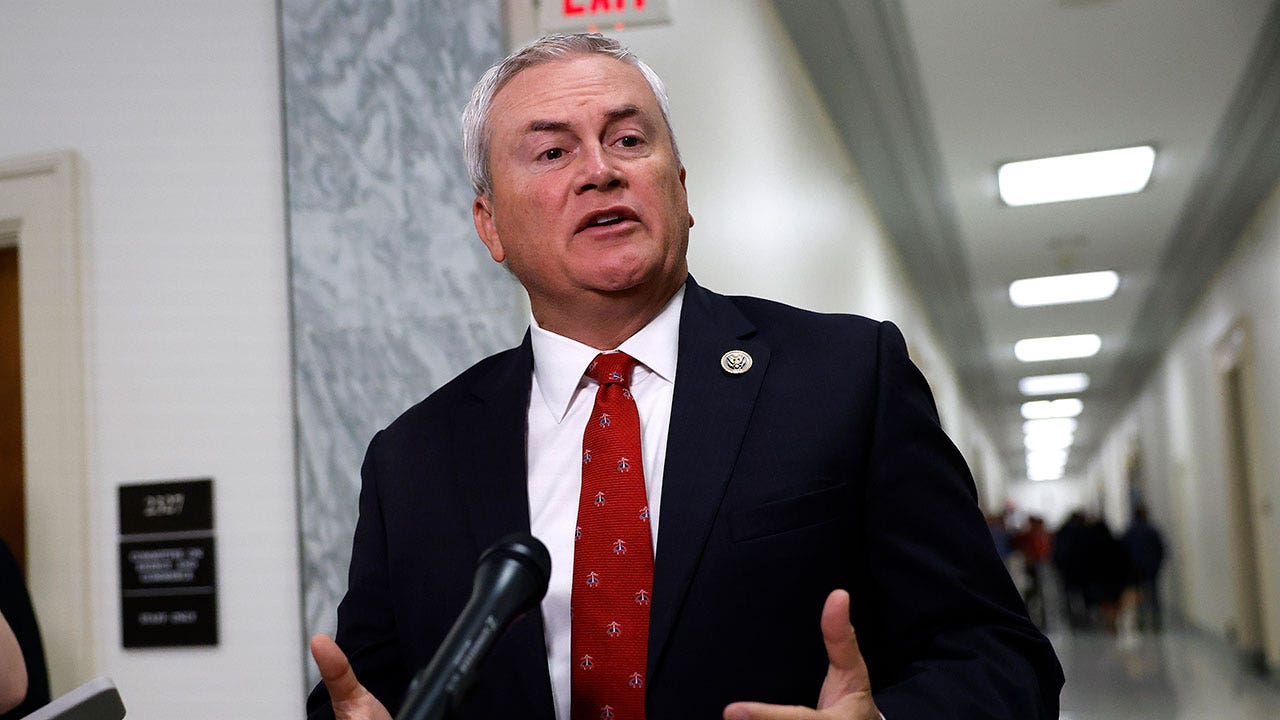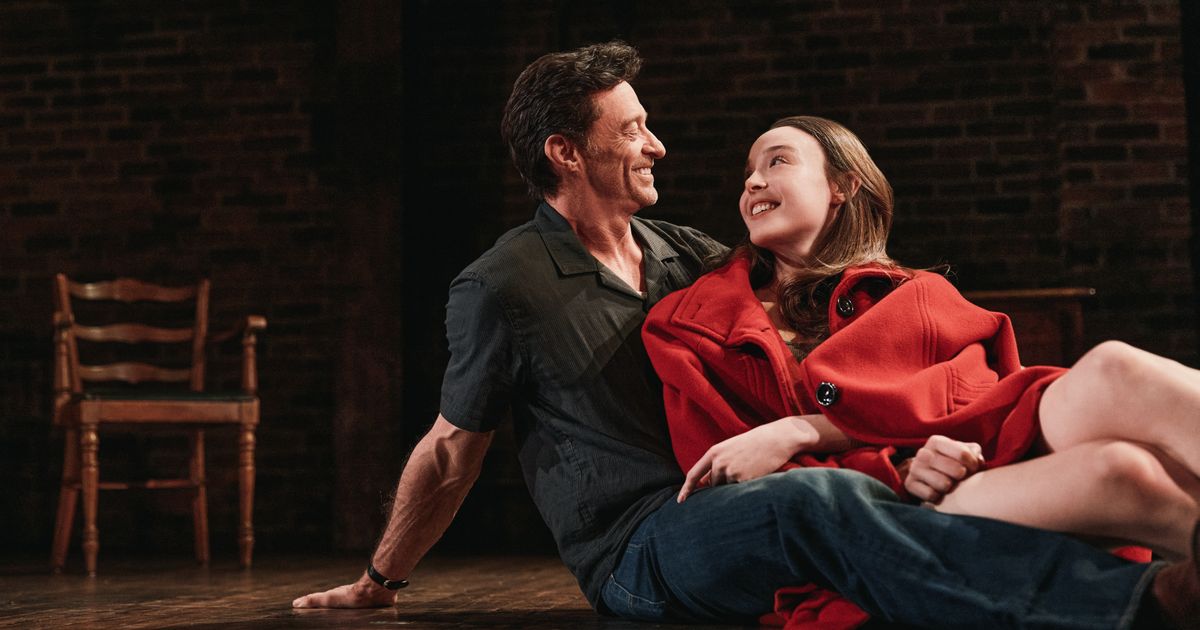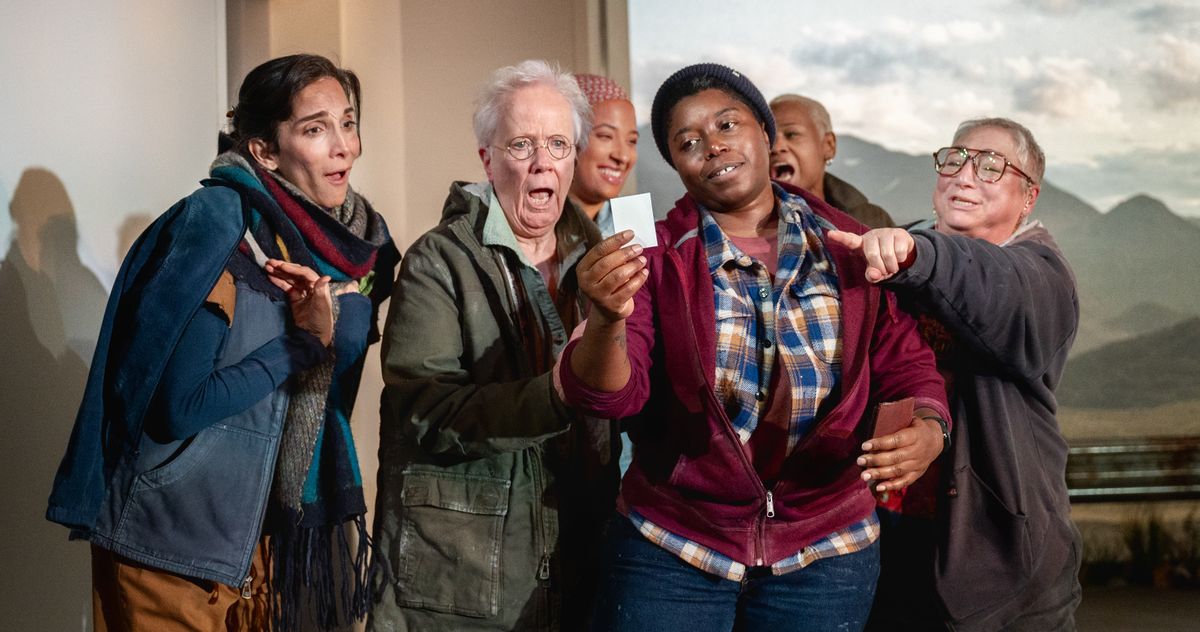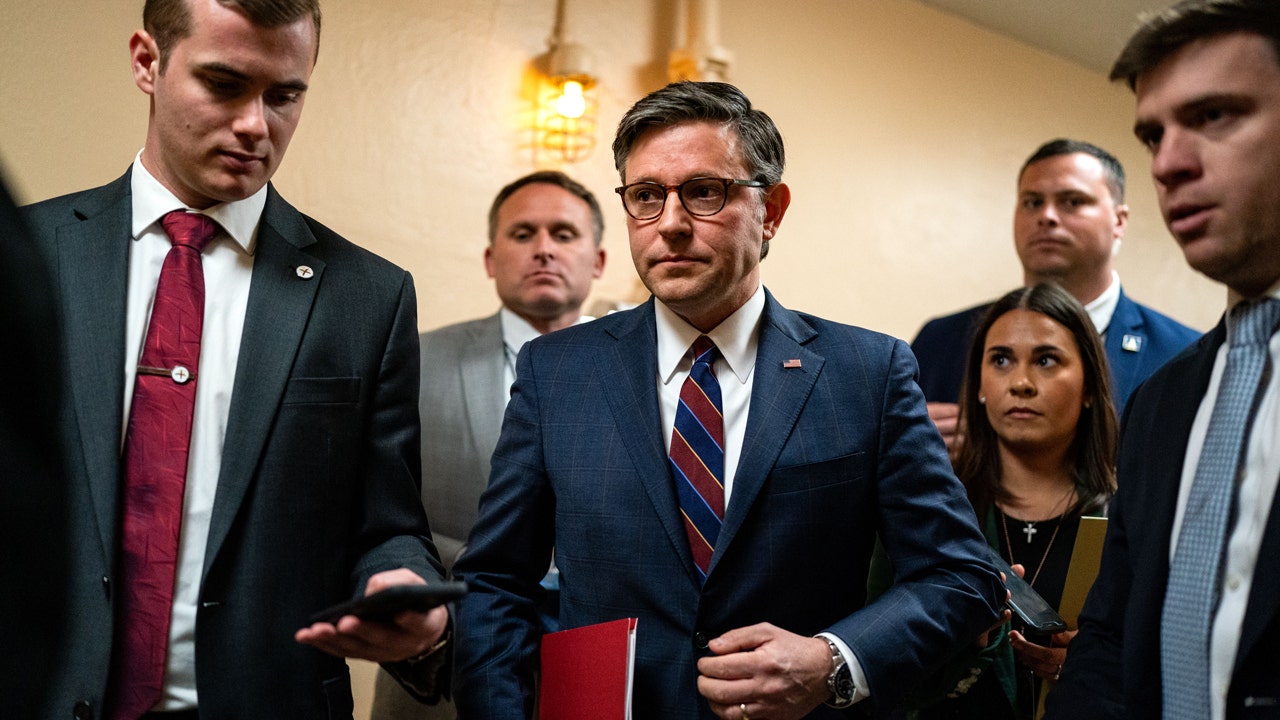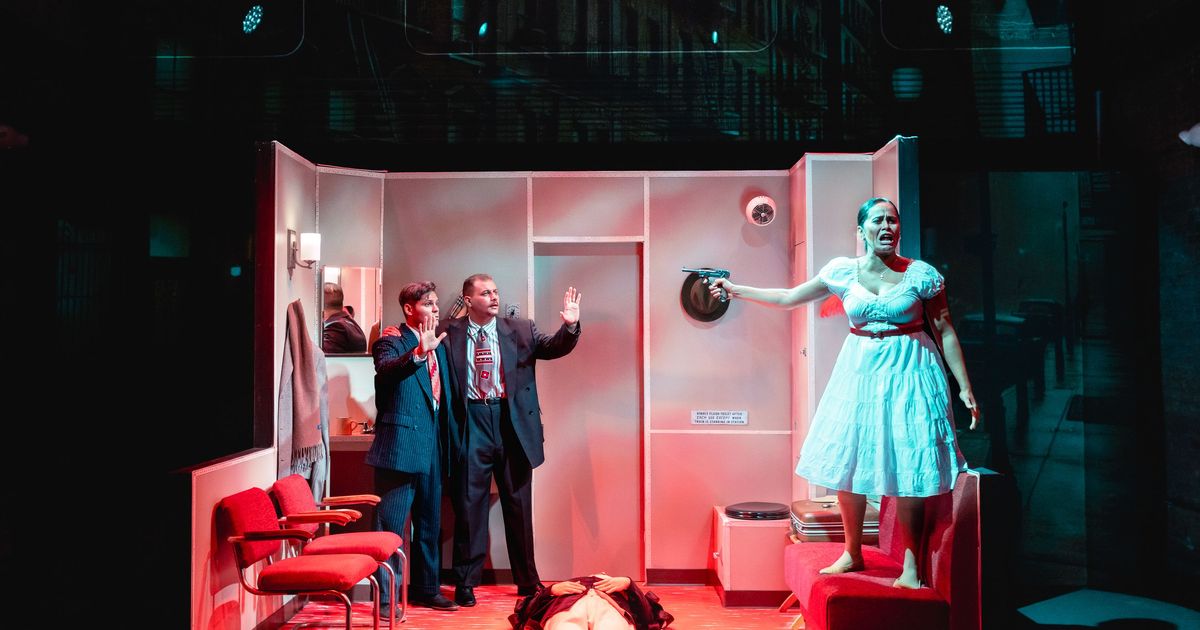Jackman and Beatty in Sexual Misconduct of the Middle Classes.
Photo: Emilio Madrid
The focus in a piece of writing about a professor-student relationship may tend to fall on the allure of the younger party, but there’s something to the fact of the fantasy image of the professor, too. He’s rumpled yet intelligent — possibly out of step with the times, but still insightful. Well-meaning, in the case of a script like Sexual Misconduct of the Middle Classes, but unwilling to resist his urges. This is a useful figure, a shaving-cream-coffee-and-musty-book-smell invention on which to project a certain brand of hand-wringing about the trouble with men. The professor writes great novels with memorable sex scenes. He inevitably name-checks unfashionably unwoke literature. He’ll take advantage of a student, and he justifies it by tricking himself into believing she’s exceptional and complaining bitterly about his estranged third wife. He runs to stay in shape, and he’s got veins that bulge across his biceps. Well, that last part is specifically because the professor here is played by Hugh Jackman, who is bringing all his Wolverine wattage to the West Village for a brief run in a straightforward two-hander by Hannah Moscovitch.
Jackman is the kind of performer — a greatest showman, if you will — who seems to be trailed by a spotlight wherever he goes, even in the modest space of the Minetta Lane Theater, where he’s producing Sexual Misconduct with the British impresario Sonia Friedman as part of a new venture called Together. (It’s also a partnership with Audible, which owns the theater and will release recordings of these performances.) The aims are noble, with a low ticket price and an emphasis on the availability of free and rush tickets, if Moscovitch’s play itself doesn’t make for the most striking vehicle. Jackman’s professor, Jon, who narrates, becomes fascinated by a shy 19-year-old student named Annie, played by Ella Beatty. Both are nearly stock characters — in hearing about Jon’s writing, I got stress flashbacks to the similar characterization of Robert Downey Jr. in McNeal. Is she leading him on, or is that just his imagination? Moscovitch’s play poses familiar quandaries — you think of Mamet’s devil’s advocacy in Oleanna, which she surely is trying to upend — but arrives at pat conclusions about the psychological damage of having a mentor take advantage of a power imbalance. Her final twist, which you begin to anticipate early, arrives with the dramatic force of playing an Uno reverse card.
With a movie star on deck and a daughter of stars across from him, there’s an air of showboating that overwhelms nuance. That’s not despite the minimalism of Ian Rickson’s directing but because of it: He blocks the action with a scene-study-class directness, and the Minetta’s brick wall is in plain view behind Brett J. Banakis and Christine Jones’s spare set. Look at us, serious actors, doing a play-shaped play. It’s also that Jackman won’t, or can’t, turn off his inclination to work a crowd. He plays off any titters of laughter at inappropriate moments, especially while monologuing to the audience, which turns Jon from snakily charming into a ham. (He also seems to be using star power to justify a performance-in-process; in his narration, he characterized Jon’s memory as foggy, having the character pause as if trying to pull facts, but the actor eventually called for a line himself.)
Beatty, face-to-face with Jackman’s natural charisma, hasn’t found a way to hold her own. That’s a difficult ask for anyone, especially when playing a recessive character, though Beatty, as in her earlier performance this season in Ghosts, tends not to color outside the lines of “brittle.” Moscovitch’s script emphasizes just how young Annie is and how much Jon may be tricking himself into imagining she’s an old soul. So her reticence starts out appropriate, but when the dynamics escalate between Annie and Jon, Beatty remains much the same: on guard, with tight shoulders and wide eyes. It’s a dynamic that keeps the focus on Jon, even if it may intend for us to feel for her. His needs and his flaws — grand, primal, and by implication maybe even shared with everyone else sitting nearby — become the engine and the spectacle. What are we going to do about men like him?
There’s an answer to that, in a way, in Creditors, the other play Together is producing in rep with Sexual Misconduct. Rickson is directing both, and Creditors is also led by screen stars — in this case Liev Schreiber, Maggie Siff, and Justice Smith. If they’re not quite the draw Jackman is (I saw a few empty seats at my performance that weren’t visible at a packed one of Sexual Misconduct), it’s too bad, because this is a far sharper, smarter production, a variation on the same themes that complicates and illuminates them with greater depth.
Creditors, adapted by Jen Silverman with modern dialogue and a few crucial departures from August Strindberg’s 1889 play, takes up a similar inquiry as Sexual Misconduct: how to process the bitterness and manipulation of overlooked men. In this case, the seeds of masculine discontent come from Schreiber’s Gustav, a stranger Smith’s artist Adi meets at a seaside resort where he is vacationing with his author wife, Tekla. While Tekla is off at a reading, Gustav prods Adi with ideas that, though originating in 19th-century Sweden, would be right at home on an Infowars episode: A successful wife emasculates her husband, Adi will never create great art if he lets her flirt with other men, he should avoid having sex with her so she doesn’t steal his talent through his sperm. (A 21st-century Gustav would definitely be hawking testosterone supplements.) When Tekla returns home, she and Adi fight while Gustav lingers outside the door. In the play’s final third, things come to a head in a confrontation between Tekla and Gustav.
In that string of two-handed scenes, Rickson’s unadorned direction gets more fruitful results than in Sexual Misconduct. There’s also a bit more set-dressing, a light amount of furniture to evoke a Nordic resort, as well as a constellation of lamps that give the stage a warm orange glow in contrast to the voyeuristic blue glare through a curtain at the side of a stage (the lighting design is by Isabella Byrd). The alliterative cast members are all comfortably at home in this text, and they’ve developed complementary performances: Schreiber is decrepit but dangerous, like an old panther ready to swipe you with his paw at any moment; Smith finds a lane within naïveté that doesn’t obviate his character’s intelligence; and Siff, a firecracker onstage as usual, also brings an intriguing strain of self-doubt and worry to Tekla’s charisma. Her hair is done up with a messy nonchalance that blurs period and contemporary Cobble Hill. If her character were alive today, she’d also have a podcast, but she’d feel real bad about whoever her corporate advertisers were.
Creditors would work as its own meal, though having seen it soon after Sexual Misconduct, I found that the tensions at play opened up what Sexual Misconduct had touched on. Silverman’s adaptation, especially, emphasizes the networks of predation and sexual power. You really pay attention when Tekla says her first husband met her when she was around 15. It’s interested in how people mold one another through their relationships — fittingly for a play in which Gustav prods Adi to get into sculpture — and what happens when one outgrows the other’s mold, alongside the question of whether it’s even possible to outgrow one’s programming at all. “I wish I’d met you first,” Adi tells Tekla in one scene, a line he means sympathetically but that comes across as another stab at ownership.
Silverman edits Strindberg’s final moments so that her Creditors ends rather abruptly with the characters trying to avoid the tragedy baked into its premise. Though those last moments didn’t quite convince me, coming off as jarring and sudden staged action, I respect the impulse to throw a wrench into the structure of the drama and see what happens. (To be fair, the way that Creditors originally ends is also jarring.) You could feel the audience processing the development in the same way that the characters were, trying to solve the math of the Adi-Tekla-Gustav trio themselves. The messiness of that gesture ends up being rough and engaging, which is a good selling point for this kind of project. If you’re going to talk up the benefit of seeing stars work through material up close, what’s most appealing isn’t the stars themselves but the chance to see them actually at work. Give them, and us, a little heft to chew on.
Sexual Misconduct of the Middle Classes and Creditors are at the Minetta Lane Theatre through June 18.


